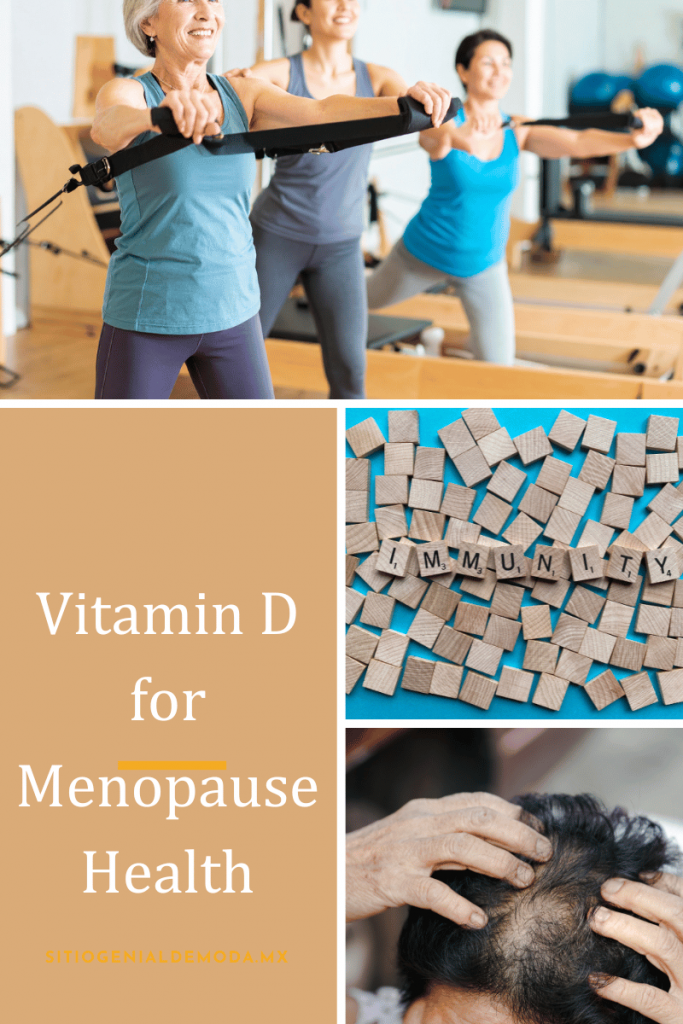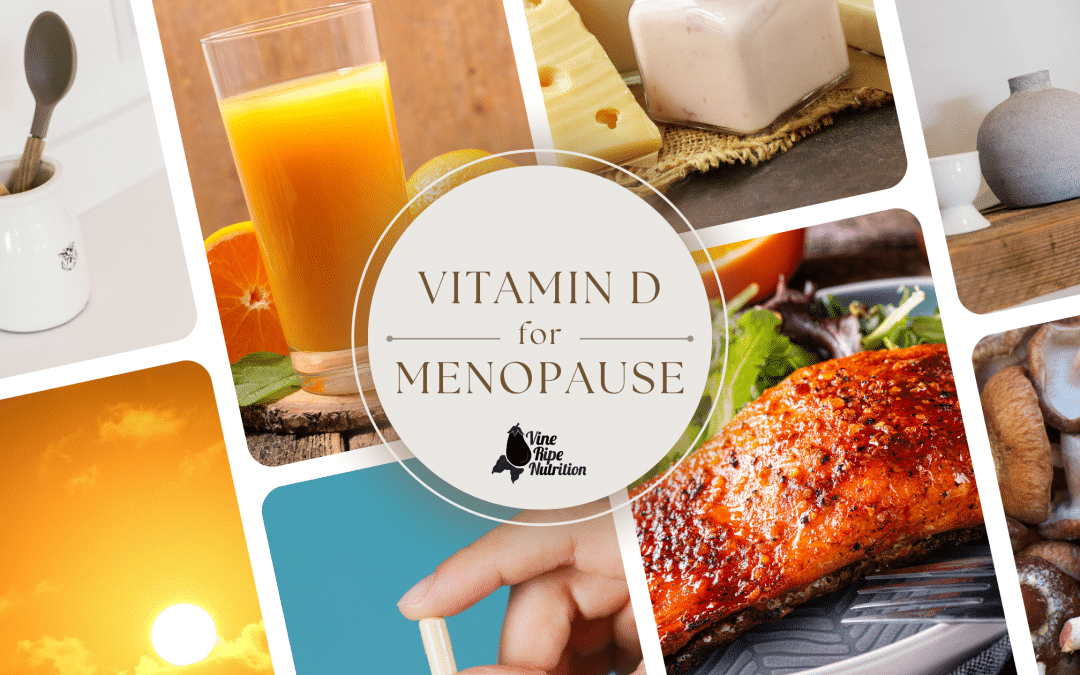The Importance of Vitamin D and Menopause Health
Table of Contents
Today, talk about the 14 essential roles of vitamin D for menopause. Last week, I discussed the vital relationship between vitamin D and cortisol. And many of us are familiar with the importance of vitamin D in bone health. But I want to share some of the additional functions of vitamin D in menopause. However, let’s first discuss this important vitamin a little further.
Some Interesting Facts About Vitamin D and Menopause
Sunshine and Food with Vitamin D
Vitamin D is an essential vitamin that is unique because we can get it from sun exposure.
There are also a few dietary sources of this vitamin, which include dairy products and fatty fish, along with some vegan foods high in D, like mushrooms, and some fortified foods like cereals and juices.
Vitamin D is a fat-soluble vitamin, so it is important to have some fat when you eat it. Many supplements are in an oil-filled capsule.
There are a large number of us who are deficient in vitamin D, so we may need supplementation. There is also a lack of consensus about how much we need, and the amounts vary between experts.
I have a little bit more about supplementation in a Substack post that I have linked to also!
This vitamin is being connected to more benefits in health, and the best way to determine if you need more than what you are getting of this essential vitamin is to be tested. And work with your physician and registered dietitian on the amounts needed. I will talk more about things to consider when choosing a vitamin D supplement below.
Let’s first talk about some important body processes for women and vitamin D that are essential for health.

What Are Some Important roles of Vitamin D for Menopause Health
Although we often think of the importance of vitamin D and bone health, there are so many other ways that this vitamin is critical for our health. Let’s look at these additional things about vitamin D and menopause.
1. Mood Regulation
Some research suggests that there is a link between Vitamin D levels and mood. This may be due to oxidation and inflammation. Maintaining adequate levels may contribute to a more stable emotional landscape during a time when hormonal fluctuations can impact mood.
2. Inflammation
Vitamin D has anti-inflammatory properties, which can be beneficial as chronic low-grade inflammation is often associated with aging. It can help reduce the body’s pathways linked to inflammation.
In addition, vitamin D deficiency can be linked to increased inflammatory markers like C-reactive protein and chronic diseases.
3. Skeletal Muscle
Vitamin D positively plays a role in muscle function and physical performance. Stronger muscles mean better balance and a reduced risk of falls, which are a leading cause of fractures in older adults.
4. Urinary Tract Infections
As women’s bodies change during menopause, many women suffer from Genitourinary Syndrome of Menopause (GSM). Many of these involve both the urinary tract and our sexual health.
Some of the urinary tract symptoms include frequent urination, difficulty with urination, and urinary tract infections.
A lot of these symptoms are attributed to our decrease in estrogen, and even the reduction of these receptor sites to be effective. But the good news is that vitamin D is connected with improvements in these urinary tract issues.
5. Maintenance of Vaginal Tissue
The loss of estrogen in our bodies can contribute to vaginal dryness, reduced libido, and other sexual issues in women during menopause. Vitamin D has an important role in helping improve some of the difficulties. And when someone has a vitamin D deficiency, it may increase these symptoms.
Other improvements with the addition of vitamin D include vaginal pH, improvement of the vaginal tissue, improvement of our pelvic floor, and a decrease in the number of vaginal infections.
6. Immune Function
Vitamin D has a controlling influence on our immune system. Research has shown that almost all of our immune cells in the body have receptor sites for vitamin D. In addition, vitamin D has an important role in immune regulation, and deficiency is linked to adverse reactions in our immune system, which include infections and increased risk for autoimmune disease.
Vitamin D is also connected to immune balance in our bodies.
7. Vasomotor Symptoms
I have talked about foods and how they may prevent hot flashes and night sweats. In addition to these foods and talking with your physician about menopause hormone therapy,
In addition, a recent study showed that postmenopausal women who had a decrease in vitamin D levels significantly had more issues with hot flashes than women who had adequate levels.
8. Prevention of Heart Disease
As we reach menopause and estrogen increases, our blood sugar may increase as well as our lipid levels, like cholesterol and triglycerides. Vitamin D has been shown to help improve these increases and be protective for our hearts.
Here are a few other ways to improve heart health.
9. Cancer Prevention
Vitamin D may have a possible benefit in helping prevent breast, colon, and prostate cancer, although this relationship is very complicated and not well understood. It is important to know that it is not a cancer treatment and should not be used in place of conventional treatment.
This article has some additional information on foods that help prevent cancer.
10. Reduced Joint Pain
Women in menopause are at risk for osteoarthritis and rheumatoid arthritis. Because vitamin D helps reduce inflammation, this may be a benefit to women with rheumatoid arthritis pain. It does not show that these same benefits are certain in osteoarthritis, and more research is needed on this.
11. Reduced Hair Loss
What we eat has an important connection to our hair growth, and this article from Harvard University has some good information on vitamin D and hair.
This is related to vitamin D, which makes the cells that turn into hair follicles. Vitamin D also supports your immune system and bones, which also helps.
12. Important Relationship with the Stress Hormone Cortisol
I was intrigued by learning more about how vitamin D and cortisol interact with each other to do important things in the body. You can read more about this in this Substack article.
13. Vitamin D and Weight Balance
Can a lack of vitamin D cause weight gain?
Vitamin D deficiency may be associated with a higher risk of weight gain, disrupt hormones that regulate appetite and metabolism, promote an increase in adipose tissue, and break down, and may increase fatigue, which may affect how much exercise someone gets.
Additional body weight may also contribute to a vitamin D deficiency.
14. Calcium Balance and Bone Health
Vitamin D’s most important role is its role in calcium absorption and bone health. I talk more about this in my most recent Substack article.
Best Vitamin D and Menopause
What is the best vitamin D for menopause? Let me share some tips on how to pick the best one for you now that you know that menopause and vitamin D deficiency can lead to health issues.
Here are some ideas to prevent vitamin D menopause.
Important Things to Consider When Choosing a Vitamin D Supplement
- There are supplements for sale that don’t have the active ingredients that they say they have, and some may have added ingredients that might not be safe. Here are two sites that will help you determine if yours has the active ingredients and that it does not have things that you don’t want. (These sites do not guide whether you should be taking a particular supplement, but I will share more on that tomorrow.)
quality-supplements.org
About U.S. Pharmacopeia - Here are two sites that share information on whether you might want to take certain supplements or not.
https://ods.od.nih.gov/
https://www.mskcc.org/cancer-care/diagnosis-treatment/symptom-management/integrative-medicine/herbs
Final Thoughts on Vitamin D for Menopause
It’s clear that the important relationship between Vitamin D and menopause isn’t just about preventing fractures; it’s about enhancing overall well-being as you age gracefully.
Working with your physician to know your vitamin D levels, making a plan to get more if you are deficient, and learning the additional benefits of this vitamin is important.
Be sure to include food with vitamin D, along with some of the vegan foods high in D.
Prioritizing your Vitamin D intake is a proactive step you can take today to protect your bones and enhance your overall health during this important phase of life. You deserve strong bones and a vibrant future!
If you want to take a deeper dive into the science of Vitamin D and bone health? Check out my latest article on Substack for a comprehensive guide!
You might also like last week’s article on vitamin D and its effects on cortisol.

I am a registered dietitian nutritionist living in Asheville. I specialize in women’s health, digestive wellness, and plant-based eating. I offer online courses on these topics, along with an online support group known as the Growing Vine Community. I would love to help you live your best life!
I also offer a weekly women’s health article on Substack and have a free e-book to fight inflammation that you can find on the Midlife Maven’s Toolbox!

